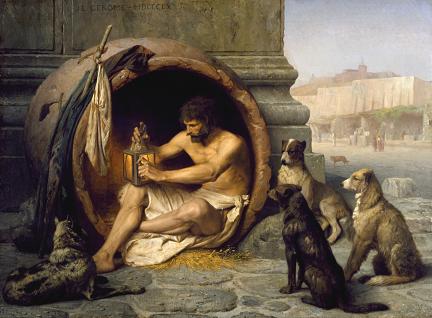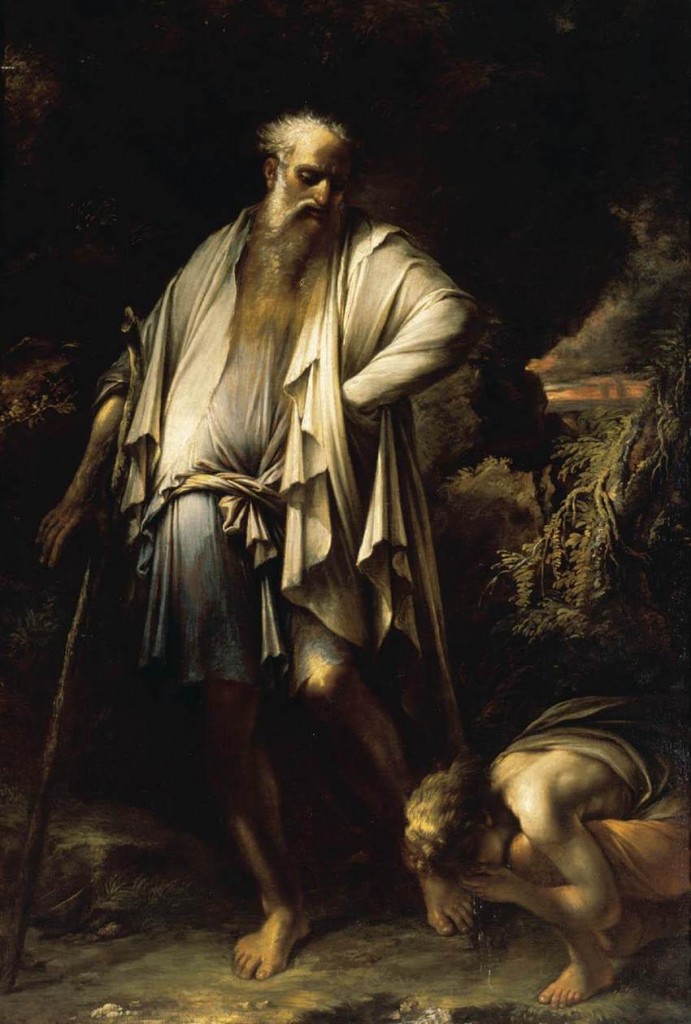At Corinth, in Greece, there lived a wise man whose name was Diogenes. Men came from all parts of the land to see him and hear him talk. But wise as he was, he had some very queer ways.He slept in a cask, and was the founder of the creed called Cynicism . People were not quite sure if he was mad or not, but he knew they were mad. Diogenes was hardly a degenerate or maniac. He did not believe that any man ought to have more things than he really needed; and he said that no man needed much. And so he did not live in a house, but slept in his cracked earthenware barrel, which he rolled about from place to place. He spent his days sitting in the sun, and saying wise things to those who were around him.

Diogenes. Jean Leon Gerome. ---Plato considered Diogenes' stray-dog behaviour unbecoming to one calling himself a philosopher. "You really do live up to your name" he said to him disapprovingly one day. "By the Gods, you are right for once Plato," replied Diogenes, and then baring his teeth, he added, "But at least I've sunk my teeth into philosophy."---Read More:http://members.optushome.com.au/davidquinn000/Diogenes%20Folder/Diogenes.html
( see link at end) …Plato was discoursing on his theory of ideas and, pointing to the cups on the table before him, said while there are many cups in the world, there is only one `idea’ of a cup, and this cupness precedes the existence of all particular cups.
“I can see the cup on the table,” interupted Diogenes, “but I can’t see the `cupness’”.
“That’s because you have the eyes to see the cup,” said Plato, “but”, tapping his head with his forefinger, “you don’t have the intellect with which to comprehend `cupness’.”
Diogenes walked up to the table, examined a cup and, looking inside, asked, “Is it empty?”
Plato nodded.
“Where is the `emptiness’ which procedes this empty cup?” asked Diogenes.
Plato allowed himself a few moments to collect his thoughts, but Diogenes reached over and, tapping Plato’s head with his finger, said “I think you will find here is the `emptiness’.” Read More:http://members.optushome.com.au/davidquinn000/Diogenes%20Folder/Diogenes.html

---Restout Jean-Bernard (1732-1797) · Restout. Diogenes Asking the Statues for Alms (1765, Toulouse, Musйe des Augustin
-Read More:http://nibiryukov.narod.ru/nb_pinacoteca/nbe_pinacoteca_artists_r.htm
…Diogenes believed that the rich man depends on his possessions, he worries about them, he spends most of his life’s energy looking after them; the thought of losing them makes him sick with anxiety. They possess him. He is their slave. In order to procure a quantity of false, perishable goods he has sold the only true, lasting good, his own independence.
There have been many who grew tired of human society with its complications, and went away to live simply- on a small farm, in a quiet village, in a hermit’s cave, or in the darkness of anonymity. Not so Diogenes. He was not a recluse or a stylite, or a beatnik. He was a missionary. His life’s aim was clear to him: it was to “restamp the currency.” He and his father had once been convicted for counterfeiting, long before he turned to philosophy, and this phrase was Diongenes’ bold, unembarrassed joke on the subject. To restamp the currency: to take the clean metal of human life, to erase the old false conventional markings, and to imprint it with its true values.
The other great philosophers of the fourth century before Christ taught mainly their own private pupils. In the shady groves and cool sanctuaries of the Academy, Plato discoursed to a chosen few on the unreality of this contingent existence. Aristotle, among the books and instruments and specimens and archives and research-workers of his Lyceum, pursued investigations and gave lectures that were rightly named “esoteric”: “for those within the walls.”
But for Diogenes, laboratory and specimens and lecture halls and pupils were all to be found in a crowd of ordinary people. Therefore he chose to live in Athens or in the rich city of Corinth, where travelers from all over the Mediterranean world constantly came and went. And by design, he publicly behaved in such ways as to show people what real life was. He would constantly take up their spiritual coin, ring it on a stone, and laugh at its false superscription.
He thought most people were only half alive, most men only half men. At bright noonday he walked through the market place carrying a lighted lamp and inspecting the face of everyone he met. They asked him why. Diogenes answered, “I am trying to find a man.”
To a gentleman whose servant was putting on his shoes for him, Diogenes said, “You won’t really be happy until he wipes your nose for you: that will come after you lose the use of your hands.”
Once there was a war scare so serious that it stirred even the lazy, profit-happy Corinthians. They began to drill, clean their weapons, and rebuild their neglected fortifications. Diogenes took his old cask and began to roll it up and down, back and forward. “When you are all so busy,” he said, “I felt I ought to do something.”








 COMMENTS
COMMENTS



